Günter-Eich-Award for my lifetime work as a radio-play maker
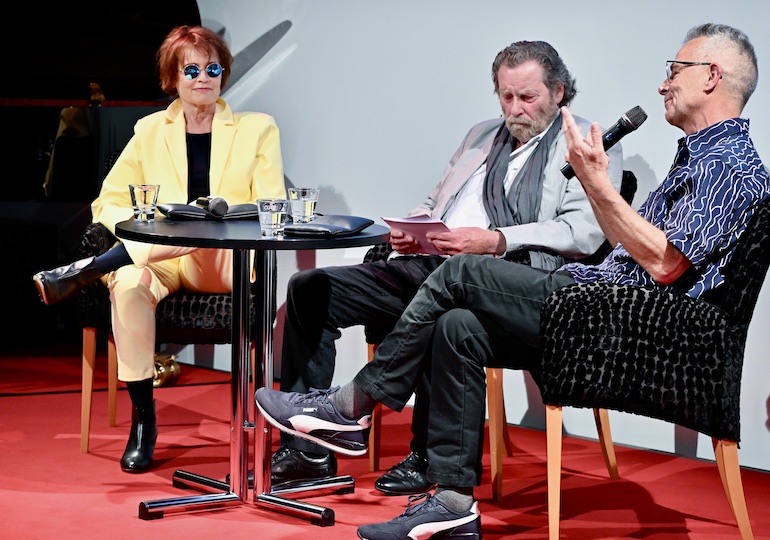
2022, I was awarded the prestigious Günter Eich Prize for my life time achievement as a radio play author. Because I was often asked where one can listen to my radio plays or read the manuscripts, I’m constructing a project here, where hopefully there are many helpful links and information to dive into this beautiful universe. Be invited to get an insight into my archive of the most outstanding radio productions over the last years.
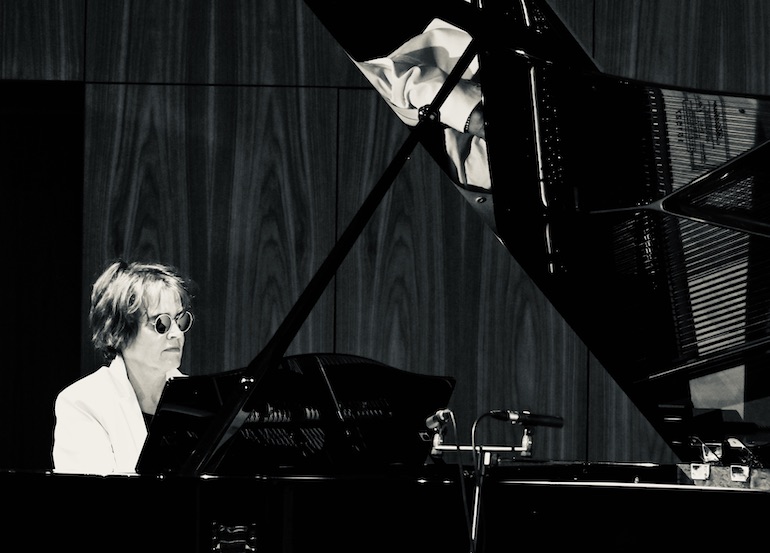
With the ears of a deer: Through hearing we recognise the world, we listen to the sounds, to what they communicate to us. We listen with our whole body, with our mind, and our heart also listens. We recognise the intentions, attitudes and states of our counterparts through tone, dynamics and articulation. In nature, we learn to recognise danger and beauty through sounds and vibrations. The acoustic signals that are sent out are as old as living beings and the world.
A radio play can bring us closer to the world, open horizons, make sound worlds accessible, stimulate the imagination and confront us with unheard worlds. In radio plays, poetry can be political, literature can be history and history can be fiction.
The radio play is far more than just a format within a broadcasting space. It is an acoustic space that itself creates new spaces. From my point of view as a composer and director, the radio play is also a musically illuminated land of thought and thus a diverse memory store, an artistic and thus human free space.
For me, language and music are equal forms of expression. Through idiosyncratic arrangements and their interlocking, they form a kind of monadic entanglement. The text becomes a libretto, libretto and composition become a score. As „conductor“, I then rehearse and study this score with all those involved. The art of all the participants is equal to the direction, together we shape the work.
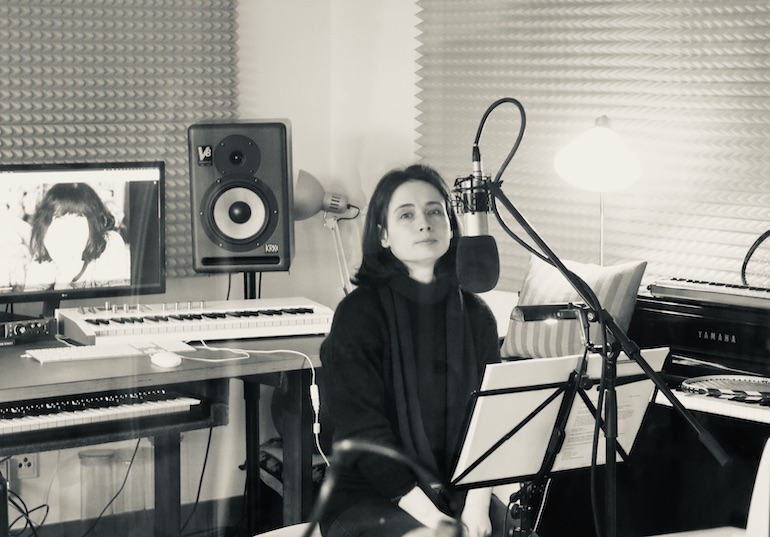
Marina Frenk Foto: Steffi Heim
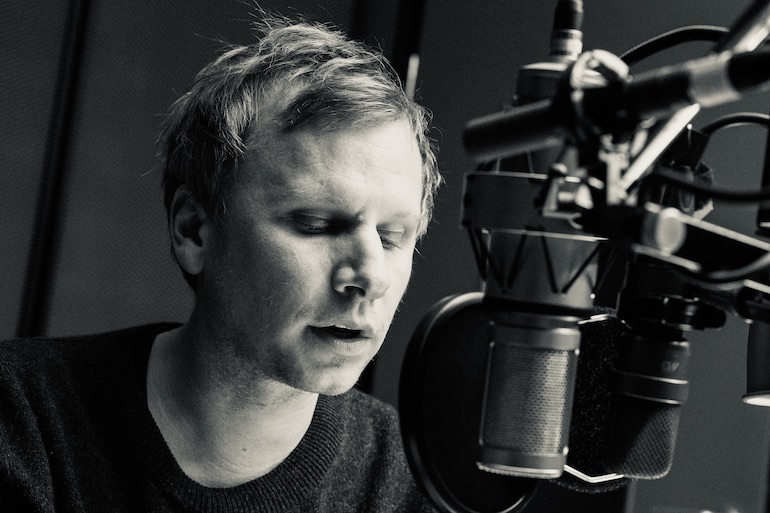
Robert Stadlober Foto: Thomas Ernst
For me, every radio play is a kind of imaginary excursion. A movement through dramaturgically carefully constructed and clearly defined soundscapes. These want to be food for thought and encouragement. In the acoustic intimacy of listening, it is also possible to trace one’s own memories and buried thoughts. Wherever words specify something concrete, the composition for the radio play opens up a further emotional space and appeals to other senses, other levels of feeling.
For my first production as a director, co-writer and musician – In our way of life, it is particularly pleasant to be invited to a party well in advance a milestone from 1999 – it was the letters of the writer Jane Bowles that became a source of inspiration and her idiosyncratic writing style: a mixture of unsparing honesty about one’s own feelings, linguistic shrewdness and rhythm. From her I still borrow the term „GoNza Magilla“ from time to time, which stands for „a big mess“.
You may listen here to: „Bei unserer Lebensweise ist sehr angenehm, lange im voraus zu einer Party eingeladen zu werden“ by Jane Bowles, Katharina Franck and Ulrike Haage.
Another milestone is the production Ding Fest Machen. In the 1950s, Louise Bourgeois shifted her interest from painting to sculpture. There is hardly a material that the idiosyncratic artist did not work with: Bread and spit, feathers and cloth, steel and bronze, marble and stone, latex, plaster, wood, glue. The composer Ulrike Haage takes her cue from this diversity of materials and formal language. The audio piece incorporates autobiographical and theoretical texts by the sculptress, interviews, poems and sound texts that deal with the central themes of Bourgeois‘ life: the confrontation with her father, with her mother, the exorcising of the past and unresolved emotions. (press release)
You may listen here to: „Ding Fest Machen“ by Louise Bourgeois and Ulrike Haage.
I would also like to mention collaborations with renowned contemporary German poets like Nora Gomringer and Durs Grünbein. Reise, Toter with Durs Grünbein is a radio play made up of miniature dramas in which unusual deaths, as comic as they are tragic, are recounted. Polished epigrams alternate with eerie stories from a distant present. And in between, a voice searches for a foothold by peering back to the beginning, to earliest childhood. Life lasts for an obituary, and if it went well, it was a journey… Ulrike Haage’s music is „thoughtfully“ used as a „mirror or counter-mirror“ to the poems by Durs Grünbein.(Die ZEIT)
You may listen here to: „Reise, Toter“ by Durs Grünbein and Ulrike Haage
A favourite of my recent radio play productions is Sprache mein Stern, Hölderlin hören (Language, my star) „A sound poem with its own unique character and a re-encounter with Friedrich Hölderlin in a very unusual way.“ The writer Ruth Johanna Benrath composes a manuscript from Hölderlin’s late work, which has long been neglected in comparison to his earlier poetry. „Yes, the poems are real, they are mine; but the name is fake; I was never called Hölderlin, but Scardanelli or Scarivari or Salvator Rosa or something.“ A slow poetry production in which every word of Hölderlin’s fine, different poems and Benraths lyrical reflections can be heard and felt. Supported by piano sounds as thoughtful as they are woven, and head noises through finger picks and pine cones. The composition is quite unobtrusive, it is a crawling of sounds that unfold their pull over time. As a listener, one can be lured into corners of this indeterminable world into which not even the enigmatic language of the piece reaches (SZ). Enjoy the great performances of Robert Stadlober, Veronika Bachfischer and Gerd Wameling.
You may listen here to: „Sprache mein Stern, Hölderlin hören“ by Ruth Johanna Benrath and Ulrike Haage
The production „Last words, qui vivre verra“ revolves around the last diary entries of William Burroughs, which we have published as a book with Sans Soleil under the title Last Words. Gottfried John’s text performance is extremely close to Burroughs‘ original voice. John and Burroughs also shared a love of cats. The diary excerpts are framed by wonderful songs in duet with Bobo and Alexander Hacke. „Ulrike Haage’s compositions reflect the eventful stages of the life of the ‚hombre invisible‘ in retrospect. At the same time, the music underlines the topicality of the visionary writer’s texts. Diverse electronic sounds combine rhythms from Morocco and America, quiet stone sounds describe the quiet everyday life of the old man with his cats. In the sound concept, the monologue temporarily turns into a dialogue that wanders off into the distance in a sequence of daydreams and chains of associations and always returns to thoughtfulness and writing, the strongest obsession in Burroughs‘ life.“ (review)
You may listen here to: „Last Words, qui vivre verra“ by William S. Burroughs and Ulrike Haage
A recent playful radio production is the 30 minute long poetic and metaphoric obituary Herzbefellt, ein Nachrufen by poetess Frieda Paris. „A writer sits at her desk and ponders. Gently, she feeds her own words. But she is not alone; together with a voice whispering to her, she is writing an obituary for Friederike Mayröcker. The multi-award-winning poet united the existential and the experimental in her art in her very own way. Thus the author speaks and writes in the radio play: I have never been more wordless than in her presence. Have been fabric, often something colourful that she alluded to. Been jewellery in her presence. Helped into her coat now and then. Her necklaces, trainers with it. While I, was flower perhaps, a lily, brought to the reading. Scent overflowing in the reading room. Wanted to sink, in curtain fabric, become invisible ink.“ The text is a tribute to the poet full of puns and allusions. Congenially realised by Marina Frenk and Lisa Hrdina.
You may listen here to: „Herzbefellt, ein Nachrufen“ by Frieda Paris and Ulrike Haage
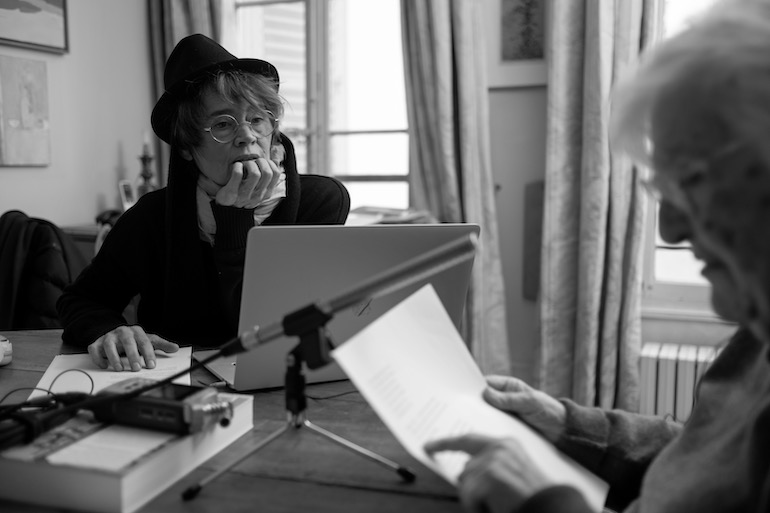
Etel Adnan and Ulrike Haage Foto: Anton Maria Storch
Perhaps one of the most important collaborations began a few years ago with the artist Etel Adnan. My friend, the translator and dramaturge Klaudia Ruschkowksi introduced me personally to the artist and we began our close cooperation in Paris. Together with Deutschlandfunk Kultur, the creations A Funeral March For the First Cosmonaut and Überweben were born.You can listen to all these radio plays like a concert performance, you can get involved like a sound installation. You don’t have to understand the poems and reflections immediately, but can let yourself be driven by the qualities of the voices and instruments, of the elegance and profundity of the streams of thought by Etel Adnan.
You may listen here to: „A Funeral March for the First Cosmonaut“ by Etel Adnan and Ulrike Haage
You may listen here to: „Überweben“ by Etel Adnan and Ulrike Haage
You may listen here to: „Dear alter Ego“ about the experimental filmmaker Maya Deren, by Ulrike Haage
You may listen here to the latest radio play: „Nichts ist sagt der Weise“ with quite unknown texts and poetry by Mascha Kaléko